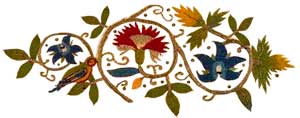
Serendipity in the Stacks
by Jinny Webber
Published in Library Book: Writers on Libraries
Edited by Steven Gilbar
https://www.amazon.com/Library-Book-Libraries-Steven-Gilbar/dp/0996601503
June, 2017
Libraries have been places of magical potential since I was a child, a source of delightful surprises. For magic to work one must be receptive, and nowhere am I more so than among stacks of long-ago purchased and much-thumbed volumes.
Once upon a time we entered the downtown Santa Barbara library through the grand door under sculptures of Plato and Aristotle, near the corner of Anacapa Street. I thought of it as the door to enchantment: who knew what would come into my hands?
One memorable day some 30 years ago, that was Sex and Society in Shakespeare’s Age: Simon Forman the Astrologer, by A. L. Rowse. An interest in that era had drawn me to the literature stacks, and with the combination of “Sex” and “Shakespeare,” the book jumped into my hands. I had no idea who Simon Forman was, beyond being the astrologer of the title, but it turns out he was a contemporary of William Shakespeare who kept a notorious diary of women who consulted him. My library card allowed me to take the book home, which eventually I did, but that aimless Sunday afternoon I carried Rowse’s study to an unoccupied table and began reading. There I stayed till closing time.
What caught my attention was a minor character in Forman’s story: a woman called Emilia Bassano Lanier, whom, remarkably, Rowse identifies as the Dark Lady of Shakespeare’s sonnets! Forman has nothing good to say about her, characterizing her as a tease and a harlot. What caught my imagination was that she wrote a book of poetry herself. That discovery introduced me to a woman I’d never heard of who’s figured in my writing and study ever since.
What I remember from that extraordinary autumn afternoon is the sense of excitement I felt reading Sex and Society, the unforeseen stimulation one finds in the library.
Today the entrance is a convenient wide corridor, with the art in the Faulkner Gallery temptingly to one side. The handsomely remodeled library has lost none of its enchantment. When going in search of one book—for example a travel guide—adjoining shelves offer unexpected nonfiction works set in that destination. Books arranged face-out offer surprise treats. And among the books on CD we can find found previously unknown novelists who become favorites.
This is one of the the precious gifts our library offers: the randomness of discovery.
No algorithm could have predicted Sex and Society for me, nor even that, published in 1974, it existed; so too with the charming House on Corfu by Emma Tennant or the audiobooks of B.A. Shapiro about art. Unsought, they’ve enriched my life. Algorithm-driven recommendations are limited by what’s currently available and endorsed: “since you liked X, you’re sure to like Y.”
Libraries, however, hold riches for our pleasure and enlightenment, books we’d never imagine we would be interested in until they jump into our hands. Serendipity and magic!
